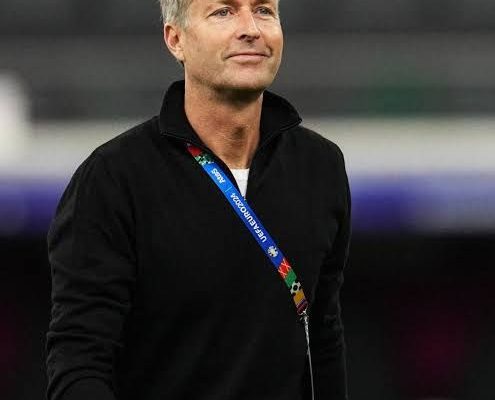The moment Kasper Hjulmand stepped onto the podium for his first appearance as Bayer Leverkusen’s new head coach, there was an air of both curiosity and expectation. Silence filled the room, the type of silence that only occurs when a crowd is truly waiting to be moved, when everyone present senses that something important is about to happen. In that silence, the Danish tactician began to speak. His words carried neither arrogance nor empty promises but instead a vision that seemed to pierce through the skepticism and hesitation of the fans, officials, and journalists in attendance. What unfolded was not a conventional press conference full of clichés, but a heartfelt declaration of intent. From the quiet opening to the trembling emotion in his voice, Hjulmand captivated his new audience and made a debut statement that hinted at more than just a managerial introduction—it was a blueprint for the future of Bayer Leverkusen.
Hjulmand promised brave, proud football. He did not disguise the challenges, nor did he exaggerate his ability to transform a team overnight. Instead, he painted a picture of collective growth, ambition, and the courage to play in a way that matches both the club’s history and its aspirations. Leverkusen is not just another club in Germany. It is a team that has lived through immense highs and crushing lows, one that has flirted with greatness but has often fallen just short of ultimate triumph. The so-called “Neverkusen” tag has haunted the club for decades, attached cruelly after near misses in the Bundesliga, the DFB-Pokal, and the Champions League. For Hjulmand, those scars are not burdens—they are fuel. In his speech, he made it clear that he did not come to Leverkusen to dwell on the past but to build a new identity, one where bravery and pride take center stage.
The audience, initially cautious, could feel the sincerity in his words. Football fans are no strangers to managers making bold claims at the beginning of their tenures. They have heard countless declarations of attacking football, of unity, of progress. But Hjulmand’s delivery was different. Perhaps it was his calm Danish demeanor, or perhaps it was his ability to weave ambition with humility, but something about his speech resonated deeper than the usual rhetoric. When he spoke of brave football, he described a team that would not retreat under pressure, a side that would meet challenges head-on. He envisioned players who carried the ball forward with confidence, defenders unafraid to take responsibility in possession, and attackers who embraced creativity rather than playing safe. This was not a philosophy built on empty slogans—it was a commitment to shaping a team that embodies both the courage to risk and the strength to recover.
At the same time, Hjulmand underlined the importance of pride. For him, pride was not arrogance, nor was it blind loyalty. It was about respect for the badge, the supporters, and the journey. He highlighted that wearing the red and black of Leverkusen should mean more than just being a professional footballer—it should symbolize a connection to a greater cause. Pride was to be found in training as hard as possible every day, in giving everything on the pitch regardless of the scoreline, and in making fans leave the stadium with the sense that their team fought until the very last whistle. That pride, he suggested, was the foundation upon which trophies could be built, because without pride in performance, success becomes hollow.
As his speech unfolded, Hjulmand began to draw his vision for the future. He did not restrict himself to tactical details, though hints of his footballing philosophy were present. Instead, he aimed higher, far above the immediate needs of lineups and formations. He spoke of identity, culture, and values. He called on Leverkusen to be more than just a football club chasing silverware. He wanted it to be an institution that inspires not only its fans but also those who watch from afar. His dream was for Leverkusen to be recognized across Europe not simply as a competitive team, but as a beacon of courageous football. He challenged the club and its supporters to embrace the idea that greatness does not come from fear of failure, but from the willingness to risk everything in pursuit of glory.
The room, once silent, began to stir as his words sank in. Reporters glanced at one another, realizing they were witnessing something different. Club officials nodded subtly, as if confirming that their choice of coach was not only strategic but also philosophical. Fans, whether present in the room or watching online, felt their skepticism begin to waver. The trembling in Hjulmand’s voice did not reveal insecurity—it revealed passion. It showed that this was not a rehearsed performance but a man laying bare his hopes and convictions. That vulnerability, combined with his determination, connected him immediately to the people he would now lead.
Hjulmand also acknowledged the weight of expectation that comes with the role. Leverkusen is a club that has long lived in the shadow of giants like Bayern Munich and Borussia Dortmund. The pressure to compete with those powerhouses, both financially and on the pitch, is enormous. But he did not shy away from this reality. Instead, he embraced it. He told the crowd that challenges are what make football meaningful, and that Leverkusen’s story would not be written by comparing themselves to others but by carving their own path. He invited the players, the staff, and the fans to think boldly, to believe that they belong at the very top of the game. It was a rallying cry not of defiance but of belief.
As he concluded his speech, the silence that had greeted his entrance was replaced by something else entirely. There was applause, yes, but more importantly there was a feeling of unity, a sense that this was the beginning of a journey worth believing in. For a club often defined by its “almosts” and “what ifs,” Hjulmand offered not guarantees but conviction. He did not promise trophies by specific dates, nor did he make the kind of claims that can later be used against a manager in failure. Instead, he promised effort, bravery, and pride—qualities that resonate deeply with supporters who want not only victories but also a team they can truly believe in.
In the days following his debut, fans continued to reflect on his words. Social media buzzed with clips of his speech, with supporters commenting on how different he sounded compared to many of his predecessors. Some were cautious, reminding others that words are only the beginning and that results will ultimately determine his legacy. But even those skeptics admitted that Hjulmand had struck a chord. His speech had created anticipation, the sense that something new was brewing at Leverkusen. In football, hope is one of the most powerful emotions, and in his first appearance, Hjulmand had managed to ignite it.
Looking forward, the task ahead for him is immense. Implementing brave football requires more than just philosophy—it requires players willing to buy into the system, tactical clarity, and relentless training. It demands a defensive structure strong enough to withstand risks and attackers sharp enough to convert chances. Hjulmand will have to balance ideals with pragmatism, ensuring that bravery does not turn into recklessness. But the foundation he laid with his speech is crucial: he has convinced fans and players alike that the journey will be worth it, even if setbacks occur along the way.
What makes his debut so remarkable is not simply the content of his speech but the way it has redefined the conversation around Bayer Leverkusen. Instead of being framed solely in terms of past disappointments or near misses, the narrative has shifted toward vision, courage, and ambition. Hjulmand has turned silence into anticipation, and anticipation into belief. For a club that has so often stood on the brink of greatness without fully stepping into it, that shift in mindset could be the most important victory of all.
Kasper Hjulmand’s debut at Bayer Leverkusen will be remembered not for tactical details or transfer announcements, but for the way he made people feel. From silence to trembling, he captivated his audience and presented a vision that was not just about football but about identity and pride. Whether or not the coming seasons bring trophies, one thing is already certain: with Hjulmand at the helm, Bayer Leverkusen will play with courage, and they will do so with a sense of purpose that fans can rally behind. It was not just a speech—it was the spark of a new era.



